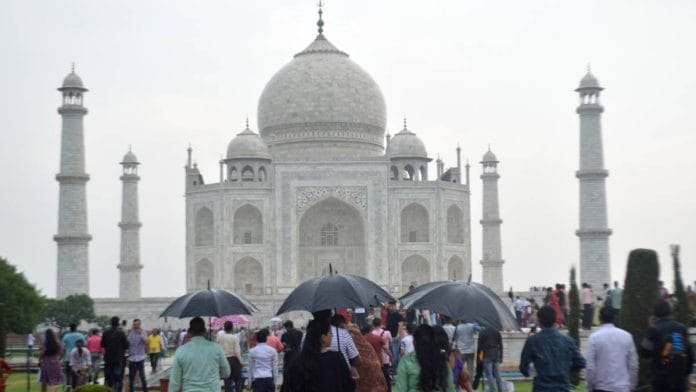New Delhi: The Supreme Court-appointed Central Empowered Committee (CEC) has suggested felling of 2,818 trees, 1,000 less than what the Uttar Pradesh government had proposed, for widening, rehabilitation and upgradation work of the Agra-Etah stretch, which falls within the Taj Trapezium Zone (TTZ).
The CEC has also laid down conditions for the state government before it can commence work on the 51 km stretch of national highway 321G.
In its report submitted to the Supreme Court this week, the CEC has said the state government must undertake compensatory afforestation by planting 38,740 plants of indigenous species on already identified non-forest land. The government will bear the cost of this compensatory afforestation drive, the committee has recommended.
The CEC, through senior advocate ADN Rao, gave the report in response to the top court’s order, which in January this year had asked the former to verify Uttar Pradesh’s claim that it needed to axe 3,874 trees for the construction work of Agra-Jalesar-Etah road.
“We request the CEC to do the exercise of ascertaining whether without compromising on the alignment of the proposed road, it is possible to save trees,” a bench led by Justice Abhay Oka had ordered on UP government’s application wanting the court’s approval to cut the trees for the road construction project.
The top court has been monitoring development work in the TTZ area since 1986, after advocate M.C. Mehta filed a public interest litigation to protect world heritage site Taj Mahal in Agra. Since then, it has issued a slew of directions to regulate industrial as well as tourist activities in the area, which it earmarked as the TTZ.
On Thursday, upon the report’s perusal, Justice Oka’s bench observed UP government’s plea that asked for felling of 3,874 trees for the road-upgradation project. Given that the CEC’s report has identified 2,818 trees for felling, the court noted that the state prayed for felling of 1,000 extra trees, which was “completely unwarranted” and showed a “casual approach” of the state towards the environment.
“State is the custodian of environment,” the court remarked, as it asked the UP government to explain why it had sought permission for felling of extra trees. “We are not here to just rubber stamp state’s view,” the bench said, directing the state government to file an affidavit stating that it was accepting the CEC’s report.
“If yes (the report is accepted), then the state has to disclose the name and designation of the officer who advised felling of more trees that could have been saved,” the bench ordered.
Also Read: Agra man is on a mission, his target — 100 electoral defeats
The CEC’s report
According to the detailed report of the CEC, though the UP government wanted to cut 3,874 trees for the road project, a detailed examination brought the number down to 2,818.
During field visits, the CEC identified 818 trees that need not be axed for the road project and found that 229 trees can be translocated. Besides, it has also located space on both sides of the road where, according to the committee, 2,400 tall saplings can be planted.
In its report, the CEC has further pointed out that land measuring 42.684 hectare has been identified for compensatory afforestation and the UP government should notify it as protected forest area before it cuts the trees for the road project. The boundary of this site will be covered by a six-feet-high chain-link fence so that the plants remain protected from cattle and other animals.
The CEC wants the UP government to make an advance deposit of the funds that are required for the compensatory planting, as estimated by the state forest department, with the divisional forest officer concerned, before permission is issued for felling of the trees. Similarly, the cost that will be incurred for planting 2,400 saplings should also be deposited with the forest department, the committee has said.
It has asked the court to fix responsibility on the state forest department to ensure no illegal felling of trees takes place.
The CEC further pointed out that the upgradation work of the national highway would require diversion of more than one hectare of notified forest land. Compensatory afforestation of the same should also be ensured, besides strict compliance of the conditions imposed by the Centre in its approval plan.
In a related development, the court asked the UP government and the Centre to submit their responses to an application seeking Agra to be declared as a heritage city.
The Centre, through Additional Solicitor General Aishwarya Bhati, opposed the application and informed the court that UP had already filed a written objection to the same. She said the Centre was supporting UP’s stand on the ground that most historical monuments in Agra fall within the TTZ area, which has remained secure on account of the court’s regular monitoring of commercial and tourist activities in the region.
(Edited by Nida Fatima Siddiqui)
Also Read: Politics over namaz inside historic Taj mosque likely to survive beyond 2019






